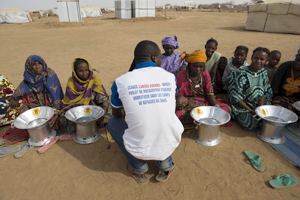
Women are the main user of the oven programme OCADES/HCR In the camp of Godebu in Burkina Faso.
Credits: Photo Simone Stefanelli
“When we arrived at the refugee camp, we had nothing,” said Madina Wallet, who escaped her town of Gao last February as Tuareg and Islamist rebels swept through northern Mali. “It took us three days by donkey before we reached the border with Burkina Faso.”
Wallet, 29, her mother, sister and 11 children now live in a camp in Godebu in Burkina Faso. Over 380,000 people have been uprooted because of the conflict in Mali. More than 150,000 refugees have fled to neighbouring Mauritania, Niger and Burkina Faso, while nearly 230,000 have sought safety in other areas inside Mali.
The refugees are arriving in semi-desert areas of neighbouring countries, where populations already struggle to cope with lack of food and resources. This wave of people puts huge pressure on the local environment driven by the increased demand for firewood and pasture for livestock.
Ocades-Caritas Burkina Faso is working in Godebu camp and four others run by the UN’s refugee agency UNHCR. They are providing energy-saving stoves to the refugees that reduce the amount of wood needed. They’re more environmentally friendly and also more effective for cooking in the open.
“There is a lot of wind here in the desert,” said Madina, so she says that the cylindrical shape of the stoves provided by Caritas helps protect the flames. “With the traditional fire of three stones, we are wasting a lot of wood.”
A World Bank study shows that over 34 percent of heat is saved with the new stoves, while 95 percent is lost with the traditional stone fires. They also reduce carbon emissions as well as noxious fumes that affect health, especially among children.
“Daily consumption of wood is amount 6-19 kg, or 2.4 tonnes a year,” said Sabas Hamidou Diallo, who manages the project for Caritas. “It’s a lot of wood, so it’s important to manage the use of firewood and ensure it’s used efficiently. We need to raise awareness among the refugees about this issue so that the environment is respected.”
The stoves are metal but also Caritas teaches the refugees how to make clay stoves based on the same design, which have the added benefit of being biodegradable. The project involves training facilitators and “team leaders” chosen among refugees, especially the women who are traditionally responsible for cooking the food.
Madina has been chosen as one of the team leaders. “Making the clay stoves is not too difficult because we know about pottery,” she said. “The only problem is that with so many refugees coming here, we struggle with demand.” They get a salary and a staff position.
Training workshops organised by Caritas also address environmental issues, such as the protection of the ecosystem. Working with forestry officials, dead wood for use as firewood is identified and trees that are to be untouched are marked with red paint.
Teams of refugees and local people are set up to collect of wood in predetermined areas through a cash-for-work programme. This also helps foster friendly relationships between the two groups.
“It’s important that the refugees are learning new skills to protect the environment,” said Hamidou. “And it’s the refugees themselves who become the resource to overcome this issue.”
